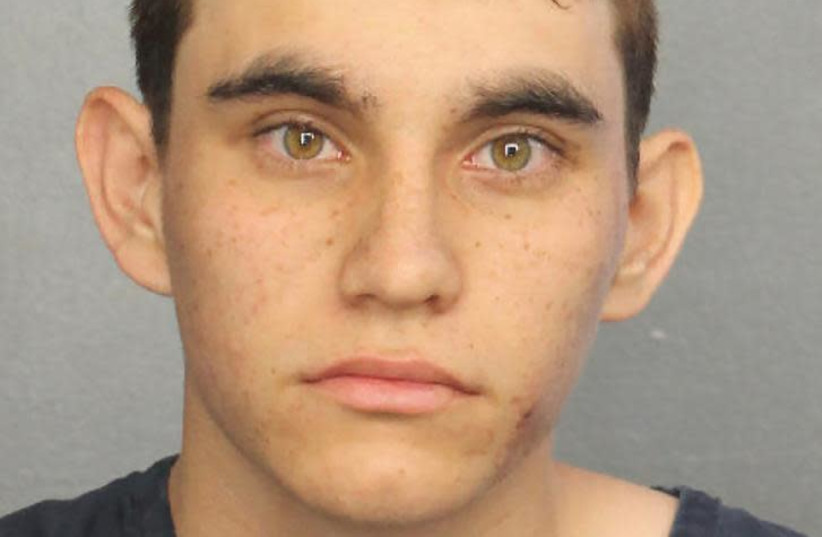"His actions were indefensible. Inexcusable," his lawyer said Monday.
"But it’s time for a Broward jury to shift its focus, at least for a while, from the murders committed on Feb. 14, 2018, at Marjory Stoneman Douglas High School to the flawed, broken person who committed them," confessed gunman Nikolas Cruz.
In an 86-minute opening statement, Assistant Public Defender Melisa McNeill walked a tightrope, portraying Cruz as a victim from the womb, where his prenatal nutrition consisted of “Colt 45, Cisco wine, crack cocaine and cigarettes,” while making it clear that no one is trying to justify the 17 murders he committed on the Parkland campus.
“There is no defense to these crimes,” McNeill said. But the defendant’s story did not begin the day he shot up the school, she said. It began with poor decisions made by the woman who brought him into the world.
Brenda Woodard, the defendant’s biological mother, was a drug-addicted Fort Lauderdale prostitute whose lifestyle put her son at a disadvantage from the start, McNeill said. “She was drinking, she was drugging, she was smoking, and she was selling her body,” she said.

Even after she decided to give him up for adoption, Woodard did little to ensure that the baby she was turning over to Lynda Cruz and her husband, Roger, was happy and healthy.
The couple came to South Florida from Long Island, New York, and Lynda Cruz, 48, longed to have a child to raise. Roger Cruz was already in his 60s. Nine months after they adopted Nikolas, they learned his mother was pregnant again. They would go on to adopt the half-brother, who they named Zachary.
During her pregnancy with Zachary, Woodard was in jail and receiving adequate medical care. Zachary Cruz was not born with the same mental challenges as his brother.
By the time Nikolas Cruz was 3 years old, he was exhibiting problems that led to him being seen by a psychiatrist. McNeill walked the jury through a tragic history of efforts to diagnose and treat Cruz while meeting his educational needs at the schools he attended.
“His brain was irretrievably broken,” McNeill said. He was nearly strangled by his own umbilical cord at birth and had to be rescued by doctors.
The defense is arguing Cruz suffered from fetal alcohol spectrum disorder, among other mental illnesses.
“You will hear that he received a lot of services,” she said.
The Parkland shooter's childhood
Cruz was still a young child when he watched his adoptive father collapse in front of him from a fatal heart attack. He had bizarre outbursts in school that included acting up in class and sometimes acting like an animal. His teachers at Westglades Middle School begged for him to be transferred because his antics were depriving other students of their education, McNeill said.
The defense has been barred from raising the school and justice systems’ failures as mitigating factors, McNeill avoided casting blame on anyone but Cruz and, to a lesser extent, his adoptive mother, who sometimes took him off prescribed medications because they were too expensive.
Cruz made his best progress at Cross Creek School in Pompano Beach, McNeill said. By then it was clear that he had major behavioral issues, and the school had the staff and expertise to deal with it.
When he was assigned to Stoneman Douglas, a psychiatrist urged that he be kept out of the Junior ROTC program because of his unhealthy fascination with guns.
The advice was ignored.

Finally, tragically, Cruz declined continued mental health services after he turned 18. He was expelled from Stoneman Douglas a short time later.
On Feb. 14, 2018, he returned to the school.
It would only take one juror to keep Cruz off death row for the 17 murders he committed that day, and the juror would have to answer to no one for the decision.
“The decision can come from all of the things that Nikolas Cruz did not show those 17 souls,” McNeill said, turning the defendant’s rampage into a heartfelt plea not to respond in kind. “It can come from compassion. It can come from grace. It can come from mercy.”
Two witnesses who knew his biological mother
Two witnesses were called to the stand to start the defense’s case — Carolyn Deakins, a recovering drug addict who walked the streets with Cruz’s biological mother and testified about the latter’s reckless lifestyle, and Danielle Woodard, Cruz’s biological half-sister.
Deakins testified Monday that she and Woodard were Fort Lauderdale prostitutes together in the late 1990s and when they weren’t turning tricks, they were getting high on whatever they could get — crack cocaine, alcohol, marijuana — even when Woodard knew she was pregnant with Cruz.
Deakins said she tried to get Woodard to stop abusing drugs during her pregnancy, “but she didn’t care” since the baby was going up for adoption.
At one point in her testimony, she looked at Cruz at the defense table and said, “Nikolas, I’m sorry, but that’s how it was.”
”He was full of life…moving around a lot. I was looking at him, holding him, he was looking back at me…real squirmy. And I looked at my mom, I said, can we keep him?”
Danielle Woodard, Cruz's half-sister
Woodard described her mother, who died earlier this year, as “horrible” and confirmed that Brenda Woodard made no effort to remain healthy during her pregnancy.
“She had addiction...she always put that first,” Danielle Woodard said. The adoption was necessary “for him to have a better life, for him to take a different path.”
Woodard, who even as a young child called her mother by her first name, described a childhood that was anything but — an unstable home life, watching her mother drink, smoke crack cocaine and cigarettes, and witnessing addiction-fueled outbursts and numerous arrests.
She recalled times when Brenda welcomed other addicts to use their efficient apartment as a place to use drugs. Danielle Woodard would go to a neighbor’s house or walk on nearby train tracks.
“I spent a lot of time playing by the river right by here...anything to get away,” Woodard said.
When Woodard walked into the courtroom Monday, it was only the second time she had seen her brother Nikolas. The first was when he was an infant when she held him.
”He was full of life…moving around a lot. I was looking at him, holding him, he was looking back at me…real squirmy. And I looked at my mom, I said, can we keep him?”
The final defense witness on Monday was Susan Lubar, a teacher at River Glades Elementary whose classroom was where Cruz was between the ages of 3 and 5.
She described how he entered her class with developmental delays and language impairment, and “a lot of aggressive behaviors.”
“Nikolas would push children, would scratch at them, would topple over furniture. He would stay away from other children, and if they got too close to him he would basically pounce,“ Lubar said.
She talked about his animal behaviors as something that she had not experienced with other children.
“Curling his hands into paws, hissing, scratching out, scaling furniture...that was pretty unusual to see that,” she testified.
Lubar created a part of the classroom that allowed Cruz to act out his animal behaviors, by looking at animal books and playing with stuffed animals. It was used as a reinforcer to help him do classwork.
“He needed a very high reinforcer to come out of that and do some work...That’s how I was able to work with him at all,” Lubar said.
The defense will continue to present its case when the court resumes on Tuesday morning.
